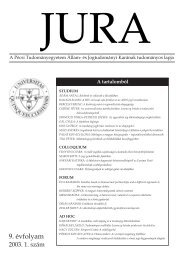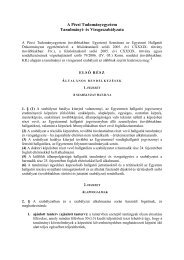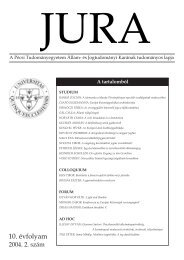2012. évi 2. szám - Jura - Pécsi Tudományegyetem
2012. évi 2. szám - Jura - Pécsi Tudományegyetem
2012. évi 2. szám - Jura - Pécsi Tudományegyetem
- TAGS
- jura
You also want an ePaper? Increase the reach of your titles
YUMPU automatically turns print PDFs into web optimized ePapers that Google loves.
Máté Julesz: Civil Society and Environmental ProtectionEnvironmentalism is therefore more strongly representedwhen ethnic minorities are involved. Thisis a result of the historical oppression of minorities,and has virtually nothing to do with environmentaljustice.Environmentalism and minority problems arefrequently topics of discussion in scientific studies,whereas the protection of the environment of physicalworkers and of retired lower-class people usuallydoes not receive scientific attention. The largest minorityin Central and Eastern Europe, the Romanygroups, suffer from serious diseases in a strikinglygreater proportion than the national majority. Publichealth researches have demonstrated that increasingnumbers of Romany people are exposed to thevicissitudes of unfavourable environmental healthconditions. A similar phenomenon was revealed asregards the black population in the United States ofAmerica during the 1960s and 1970s. This led EasternEuropean politicians to make a detailed examinationof the manner in which the Americans set out to solvethis problem. After large sums of public money hadbeen spent on this examination, the governments inEastern Europe concluded that the situation of blackpeople in America had nothing in common with thatof Romany people in Eastern Europe. Environmentaljustice for the Romany minorities could be a majorissue within the radius of action of civic control.The provision of improved environmental andwork health conditions for the Romany minoritiesshould be one of the main goals of Eastern Europeancivil societies. From a different aspect, environmentalinjustice may concern ethnic minorities living outsidethe borders of their motherlands. This is not purelya European problem, but such minorities in Centraland Eastern European countries often suffer fromenvironmental injustice, which may be either latentor apparent. Historical fears tend to dissuade statesfrom interfering in the home affairs of neighbouringcountries, in which situation the civic activismof local people, backed by the civil society of themotherland, may come to the fore. This is a preferableway to struggle for environmental conditionsequal to those enjoyed by the majority. Naturally,activism by civil society is in no way to be confusedwith radical nationalism.Environmental injustice may cause offence toRumanians living in the Ukraine, Hungarians livingin Serbia, Slovaks living in Hungary, Turks living inBulgaria, etc. At a state level, attempts to impede suchnegative environmental discrimination remain faint.Civil society must be impartial, i.e. independent ofparty politics. Cross-border civic activism is undesirableif the civic character is eclipsed by politicalradicalism, chauvinism or other negative factors.7. Social Dangerand Environmental Danger115Civic control in environmental matters may possiblyhave a negative outcome, one of the most relevantsources of social danger being a civic control groupwith various motivations. As the civil society is aninclusive society, no citizen should be excluded unlessposing a danger to society. Environmentallycounterproductive activity, although a potentialthreat to society, is not necessarily to be classifiedas socially dangerous activity. Civil society oftenplays the role of counteracting both the state andthe economy.Industrial activities carried out without due respectto the state of the environment may result inlocal ecological catastrophes, as occurred in 2010,when the disaster caused by red sludge in WesternHungary made headlines in the world press. In thiscase, an environmentally dangerous activity poseda threat to the local system of ecology, though thequestion remains open as to whether a social dangerwas also generated. Civil society immediatelybecame active on the spot. The company involved,as an economic actor, was pilloried, but until socialdanger is proven, criminal liability can not be established.Civil liability was, of course, established. Thisexample illustrates that social danger is normallyinherent in criminal liability. Without proof of a socialdanger, civil society may make use of civil law andadministrative law institutions, though the latter arefar too weak to truly serve civic motivations. Civicactivity therefore remains restricted to the collectionand dissemination of information, and normally tocharity. Charity is not a legal tool at the disposal ofcivic activists, but is rather a moral action of ethicallymobilized individuals (’moral’ and ’ethical’ asconstrued by Hegel).8. Coquetry with RadicalismRadicalism is a real and existing danger to civicactivism, not solely in the developing countries, butadditionally in their better-off counterparts. Europeand North America are also affected by radicalismoverruling a ’rule of law’ type of environmentalaxiology.Radical activism may assume the shape of politicalactivism and also the shape of civic activism. Radicalpolitics are bound up with radical civic activism,and radical political parties can never exist without asolid social basis. Radicalism is usually strengthenedby economic and social crises. When radicalism turnsJURA 2012/<strong>2.</strong>
















